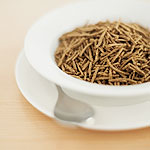 One key way to lower your cholesterol is by upping the amount of fiber you consume. Fiber is very healthy on a number of bases, and is critical for your digestive system. Here I look at the evidence for its ability to fight high cholesterol.
One key way to lower your cholesterol is by upping the amount of fiber you consume. Fiber is very healthy on a number of bases, and is critical for your digestive system. Here I look at the evidence for its ability to fight high cholesterol.
In many large population studies, a diet high in total dietary fiber (more than 25 grams a day) is associated with a reduced risk for heart disease. Moreover, soluble fiber has a greater LDL (bad) cholesterol lowering effect than insoluble fiber. There are four randomized, controlled studies that showed that a high-fiber diet significantly reduced LDL cholesterol and triglycerides.
In this first study, 127 free-living postmenopausal women with high cholesterol levels were randomly assigned to one of these diets for six weeks:
1) Oats/milk group;
2) Wheat/soy group;
3) Oats/soy group; and
4) Wheat/milk group.
This study showed that the addition of oats reduced triglycerides and LDL cholesterol levels by three percent and 6.5% respectively. There were no additional benefits with the addition of soy in either group.
A total of 43 healthy subjects participated in a two-month study to examine the effects of a control diet and a diet containing oats. The results: the oat diet reduced LDL cholesterol, systolic blood pressure, and total cholesterol levels far more significantly than the control diet. Score another one for fiber.
In this study, 68 hyperlipidemic adults ate a test diet of fiber that is more than eight grams a day higher than the control diet. The test diet was also low-fat and low-cholesterol. The high-fiber diet reduced total cholesterol by 2.1%, triglycerides by 5.2%, total cholesterol/HDL by 2.4% and LDL/HDL cholesterol by 2.4%.
In this study, 36 overweight men between the ages of 50 and 75 were randomly assigned to consume 12 weeks of either oat or wheat cereal providing 14 grams of dietary fiber a day. In contrast to the wheat cereal diet, which had raised lipid indices, the oat cereal group showed a reduction in small LDL cholesterol (17%) and the ratio of LDL/HDL (good) cholesterol (five percent).
Together, the results show that fiber has very real effects on your cholesterol levels.
An article that reveals more on this topic: More Evidence That Fiber Protects Your Heart
